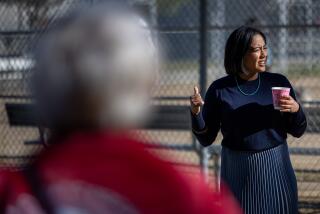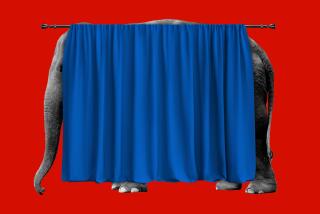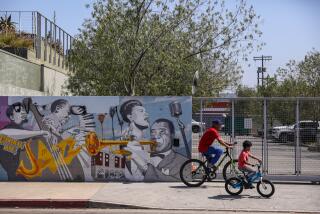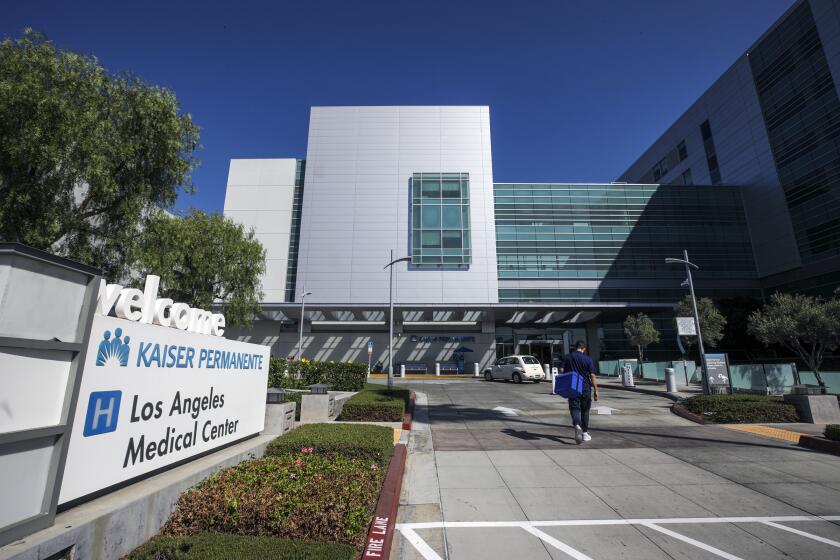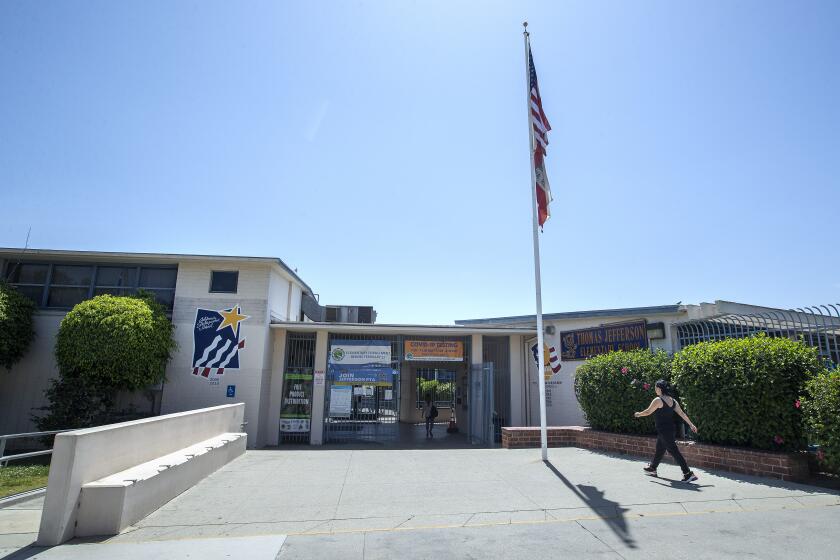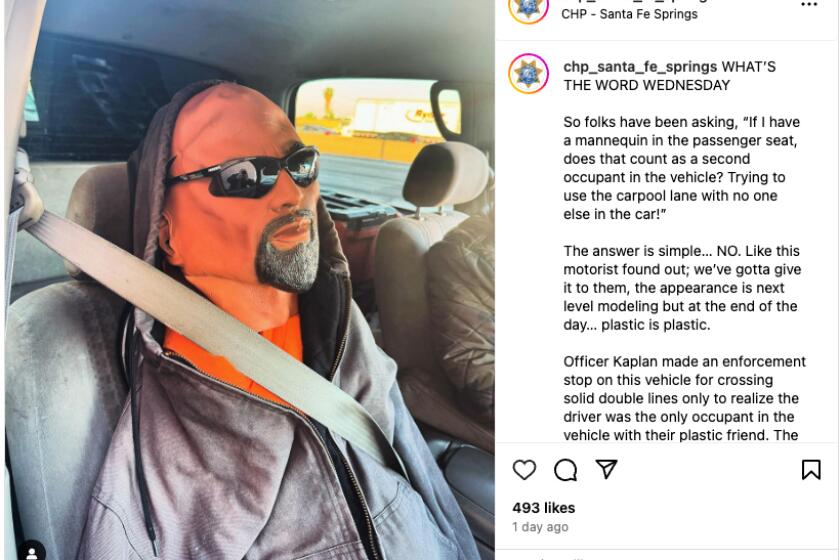Weighing mayor’s race, Yaroslavsky takes risky gambit on Latinos
For decades, Zev Yaroslavsky has thought he would make a fine mayor for Los Angeles. In three dozen years as a city councilman and then a county supervisor, he has built an extensive record and cemented a solid power base in the Westside and the San Fernando Valley that would make him a formidable candidate.
But as Yaroslavsky weighs whether to jump into the crowded race, he finds himself in an awkward position — one that could haunt his political prospects.
He has emerged as a high-profile and sometimes sharp-tongued critic of redistricting plans that create two Latino-majority districts for the Los Angeles County Board of Supervisors. He has dismissed the proposals as “a baldfaced gerrymander that is completely unnecessary” and would rip apart his district.
It’s a stand he says is based on sound principles, but one that also carries political risks. To make the leap to running the nation’s second-largest city, the five-term supervisor would have to construct a winning coalition from the city’s distinct voting blocs. And the Latino vote, which makes up a quarter of the mayoral electorate, would be a natural place for the progressive Democrat to look.
But Supervisor Gloria Molina, who proposed one of the plans flamed by Yaroslavsky, said his reaction was “not very civil rights minded.”
“He hasn’t made a lot of people in the Latino community very happy with some of the remarks he has made,” she said, predicting that many Latinos will remember. “He’ll have to suffer those consequences.”
Yaroslavsky has pitted himself against his fellow Democrats and the two non-whites on the five-member board: Mark Ridley-Thomas, an African American, and Molina, who was elected after the courts forced the board to create its first Latino-majority district two decades ago.
How he handles the sensitive issue could influence the potentially critical electoral bloc. “There’s a buzz in the community about that,” said Victor Griego, a political consultant based in Eagle Rock. Yaroslavsky’s decision reinforces an impression that he is “a Westside person,” he said.
A UCLA graduate, Yaroslavsky snagged the city’s attention as a shaggy student activist for Soviet Jewry and won his council seat in 1975 by pressing doorbells and endearing himself to Jewish immigrants like his parents. He has since become an institution in his district, particularly the Jewish neighborhoods.
His district is the county board’s whitest, 46%, but also nearly 38% Latino. Yaroslavsky is attuned to that reality: Eleven of his 23 full-time employees are Latino. Political consultant Rick Taylor, who has been close to Yaroslavsky for four decades, said he “will be able to communicate a pretty good record” to Latino voters.
In a letter to constituents, Yaroslavsky tempered his tone on the proposed Latino-majority districts. “Let me be clear: I believe strongly in the letter and spirit of the landmark Voting Rights Act.” But the law doesn’t require a second district where a majority of eligible voters are Latino because, he says, white voters are now willing to support Latino candidates.
The two proposals to create Latino districts would shift half his constituents to other districts, he wrote in his letter, “jeopardizing our progress in the crucial areas of transportation, homelessness, land use and so much more.”
Yaroslavsky declined to be interviewed. Spokesman Joel Bellman said his boss was not looking at redistricting through the prism of a possible mayoral candidacy. “That is a profound enough and tough enough issue to deal with without the potential overlay of future political plans,” he said.
Some doubt a dispute over rejiggering political boundaries will resonate in the 2013 mayoral election. But Griego said it could cost Yaroslavsky support among Latino leaders, who are able to influence rank-and-file voters. “Zev is going to have to go back and explain why he didn’t stand with Latinos and then he has to explain where he did stand with them,” he said. “In a political discussion, that’s very convoluted.”
Latino voters have turned out heavily at times to vote against candidates on the wrong side of their issues, said Thomas Saenz, president of the Mexican American Legal Defense and Educational Fund, which has all but threatened to sue to create a second Latino district. “That could turn out to be the case in a mayoral election, particularly in a runoff,” he said.
Yaroslavsky, 62, joined the City Council when he was 26. He’s toyed with running for mayor before and has good reason to consider it again: He is out of a job in 2014 due to term limits. Some consider Yaroslavsky the unannounced front-runner. But some also doubt he has the stomach for a bid, a reputation that has dogged him since he pulled out of the 1989 mayor’s race and later said: “I’m just not sure I’m willing to do what I have to do to get there.”
Then, the city’s voting age population was about 35% Latino. Now, it’s almost 44%.
If he runs, Yaroslavsky will face at least one prominent Latino contender: City Council President Eric Garcetti, who is half-Mexican and half-Jewish. Garcetti has not endorsed a specific redistricting plan. But he said, “Any plan must ensure that the Latino community is fully and truly represented with lines that give opportunity for representation that looks like Los Angeles.”
Garcetti does not flaunt his heritage, but he is at ease speaking Spanish, often attends Latino events and represents a diverse council district that is more than three-fifths Latino. Among the other major contenders, City Controller Wendy Greuel, City Councilwoman Jan Perry and investment banker and former First Deputy Mayor Austin Beutner are already raising money.
Yaroslavsky’s defense of his district was astute, said Raphael Sonenshein, a Cal State Fullerton political science professor. “This is a politician who’s very grounded in his base.”
The district includes areas he’s represented for more than 35 years and has some of the city’s top political donors and most reliable voters.
Whether Yaroslavsky can extend his Westside and Valley appeal remains to be seen, Sonenshein said. His redistricting views could hurt him in a mayoral race, he said, if that’s the only thing Latino voters know about him. “The real question,” he said, “is what relationship does he end up having with those communities between now and then.”
Yaroslavsky’s supporters argue that he has played a leadership role on issues that matter to the city’s Latinos: keeping the county’s hospital system afloat, backing a property tax measure to fund trauma care and championing the Orange Line busway across the San Fernando Valley.
He also led efforts to open a Sun Valley medical clinic where nearly three-quarters of the patients are Latino. He has plans for two more in mostly Latino areas.
Los Angeles Times data analyst Sandra Poindexter and Los Angeles Times staff writer David Zahniser contributed to this report.
More to Read
Start your day right
Sign up for Essential California for news, features and recommendations from the L.A. Times and beyond in your inbox six days a week.
You may occasionally receive promotional content from the Los Angeles Times.
